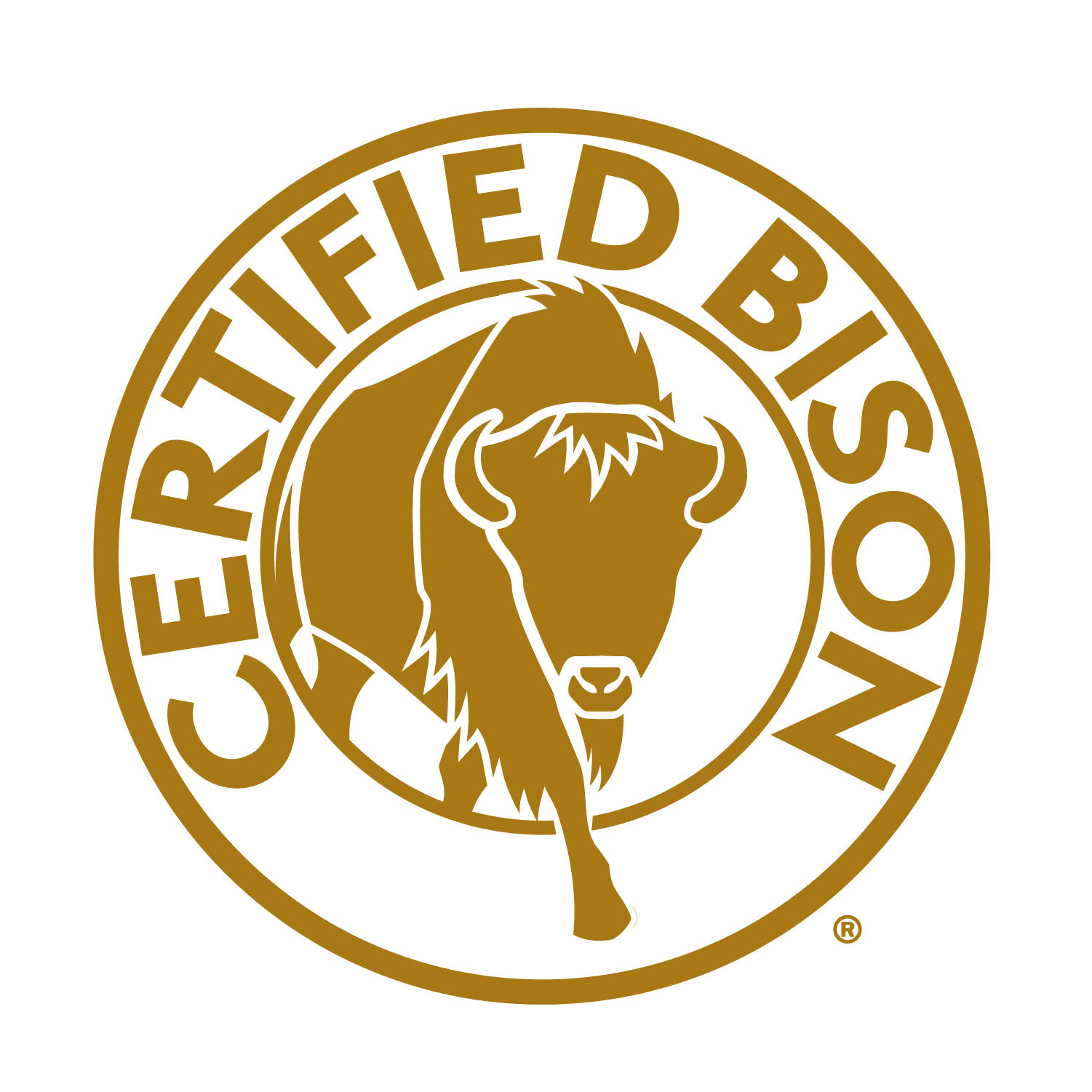Frequently Asked Questions
WHAT IS CERTIFIED BISON AND WHY WAS IT CREATED?
Certified Bison is a quality seal that ensures the bison product was produced under strict ranching, animal welfare, food safety, and processing standards. It was created in response to concerns from chefs and consumers who noted a quality disparity among different bison brands. The ultimate goal for Certified Bison is to provide a high quality, consistent product.
WHAT ARE BISON?
The animal that most Americans call buffalo is actually bison. Buffalo, most commonly thought of as water buffalo, are found in Africa and South Asia, while bison roam in North and South America. Bison come from the genus family Bison, have thick fur and beard, weighs between 700-2,000 pounds and have a large hump. Learn more here. All Certified Bison are visually inspected verifying unique bison physical characteristics.
WHICH QUALITY ASSURANCES ARE ENSURED BY THE CERTIFIED BISON SEAL?
The three quality pillars are ranching, animal welfare and processing. All the standards are verified.
WHAT ARE THE RANCHING AND ANIMAL WELFARE STANDARDS?
· All Certified Bison must meet, be verified and operate under best practices ensuring proper animal treatment and a low-stress environment including minimal human interaction, which affects product quality. The United States Department of Agriculture (USDA), Food Safety and Inspection Service (FSIS) Humane Methods of Livestock act of 1978, calls for livestock to be slaughtered in a humane manner to prevent needless suffering. Operating under a robust system includes meeting additional animal welfare verification and documentation criteria as specified and verified by in-plant FSIS personnel or the Canadian Food Inspection Agency (CFIA). Certified Bison recognizes and endorses the standards outlined in the National Farm Animal Care Council.
· Certified Bison adopt the never, ever promise mandating all bison are not treated with antibiotics or hormones of any kind. Animals treated with antibiotics for animal welfare purposes are excluded from the Certified Bison program.
· All Certified Bison suppliers must provide a producer certificate.
WHY IS FEED IMPORTANT AND WHAT ARE THE FEED STANDARDS?
Quality and monitored feed creates the consistent quality product under which Certified Bison was conceived. Certified Bison have an approved feed protocol that includes no animal by-products, must be vegetarian fed and contain a minimum level of crude protein. Certified Bison follow a free-choice feed selection where the bison can freely choose the incremental feed via approved methods and placement.
WHAT DOES IT MEAN TO BE CHILLED EXCLUSIVELY BY AIR™ AND HOW DOES THE CHILLED EXCLUSIVELY BY AIR™ PROCESS AFFECT THE QUALITY OF MEAT?
The rate at which a carcass cools significantly affects the quality of the meat. Certified Bison has researched and adopted the rate that closely mirrors those established in the beef industry. Chilled Exclusively by Air™ processing, mandates that no liquid infusion is used when chilling the carcass. The Chilled Exclusively Air™ processing is part of an overall robust Hazard Analysis Critical Control Point (HACCP) Plan. Many other bison processors use a chilling method called vascular flush, which is not recognized by Certified Bison. The Chilled Exclusively Air™ meat products are flavorful and pure products. For more information on our Chilled Exclusively Air™ meat products and processing, email us at info@certifiedbison.com.
WHAT IS PROCESSING INTEGRATION, AND WHY IS ENSURING THERE IS NO BREAK IN COLD CHAIN CRITICAL TO PRODUCT QUALITY?
Processing integration means all slaughter and meat fabrication is contained to one facility and there is no interruption in the cold chain or chilling process. Certified Bison recognizes this as the optimal food safety technique and traceability standard.
WHAT FOOD SAFETY INSPECTIONS, TESTING, AND VERIFICATION ARE REQUIRED FOR CERTIFIED BISON?
· All Certified Bison must be inspected by the United States Department of Agriculture’s (USDA) voluntary program or the Canadian Food Inspection Agency (CFIA) and must be labeled with the appropriate mark of inspection.
· Certified Bison processing plants must be a Global Food Safety Initiative (GFSI) Certified Facility. Certified Bison requires an annual third-party certificate meeting the GFSI standards with a passing score. Plants must meet Food Safety System Standards by becoming certified Safe Quality Food (SQF) or equivalent facility. SQF is a GFSI benchmarked standard, which means that it is recognized world-wide as a “Gold Standard” for food safety certification. Due to complex challenges in today's food supply chain, many of the world's largest food retailers are mandating supplier certification to GFSI standards, which include SQF. Learn more about GFSI here.
· Certified Bison requires N60+E.coli method with a test and hold. Testing for, as opposed to simply “controlling for”, pathogenic E.coli in bison is an additional level of food safety verification. An annual letter of guarantee from the processor and Certificate of Analysis (CofA), per test lot must be provided. N60+ is a sampling method used for gathering a representative surface area sample from up to 2000lbs (“combo”) of trim. The sample goes on to be tested for pathogenic (i.e. illness-causing) E.coli (0157:h7 in this instance). This sampling procedure is recognized as the “Gold Standard” method for testing beef trimmings destined for raw ground products. Through its innovative design it minimizes the error associated with excision sampling by collecting from a greater volume of the combo instead of the one to two layers typically targeted during excision sampling. Overall, the N60+ sampler collects a robust sample with less sampling error and keeps more product in the combo bin instead of at the lab. Test and Hold refers to holding products which have been tested for pathogenic E.coli until the results are released.
WHERE CAN I PURCHASE CERTIFIED BISON PRODUCTS?
High Plains Bison and Carmen Creek are both Certified Bison.
WHO DO I CONTACT TO LEARN ABOUT CERTIFIED BISON?
Contact us at info@certifiedbison.org or visit the Bison Council.
